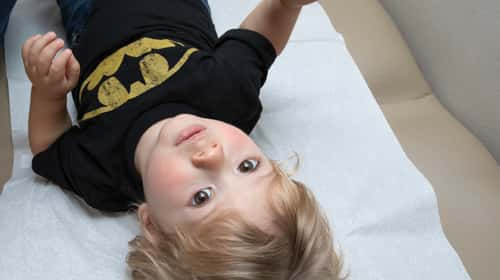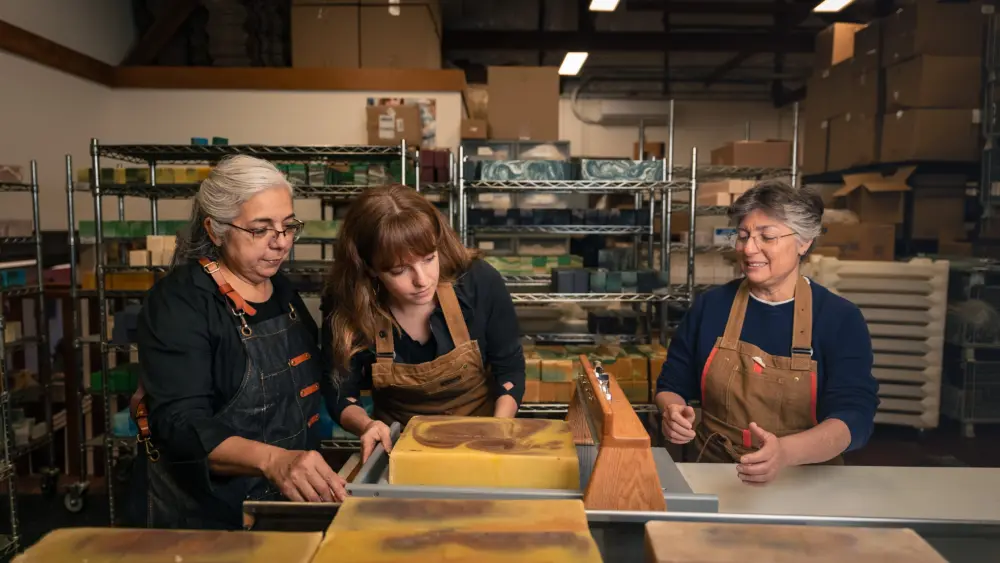Measles, mumps, chicken pox and other childhood diseases of yesteryear are making headlines again in the United States. Formally prevalent viruses and bacterium affected thousands of lives before a scientific wonder, the vaccine, largely eliminated many debilitating and often life-threatening conditions.
So why do some parents hesitate when the time for their child’s vaccination arrives? And what reason do they have to defy public health requirements that state children must be inoculated before entering public school?
Perhaps for some, the heyday of human disease is too far in the past to raise concern, and the success of medical science creates complacency. Or, maybe the public simply forgot that newborns and young children died in great numbers during outbreaks of measles or meningitis. And no doubt, too much information from a wide range of sources adds to the problem.
The age of information
With the Internet and the vast expanse of information within, people can become an instant amateur expert on anything from flying saucers to frying an egg. But misinformation is easily found on computers and mobile devises, as well. When it comes to medicine and the health of their children, where should parents go for information they can trust?
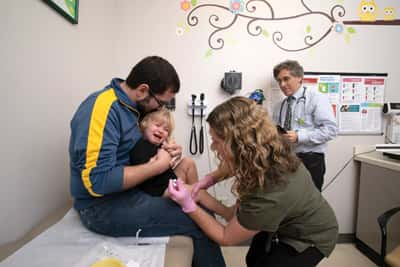 Michael Harris, M.D., a practicing pediatrician for more than 30 years, is well versed in listening to and allaying the concerns of vaccine-hesitant parents. He is also emphatic about seeking out reliable information. “I see some of the same themes in terms of misinformation that were present 20 or 30 years ago,” he says. He sees misinformation as a societal problem where the presentation of evidence-based facts often doesn’t dispel an audience’s attachment to error. “There are a number of studies that show when people are misinformed about anything and are confronted by the facts, they stick to their misconception even more firmly.” If simply presenting the scientific facts isn’t enough to dispel a fear or belief, what can Harris do? He knows it will take time to develop their trust. “We try to build relationships with parents. Over time, they come to realize we’re well educated on this [issue] and we have their child’s best interest in mind.” He also shares his own experience as a parent. “I vaccinated my children for all of these diseases, and I certainly believe it’s not against my interests to protect my own children.” As a Kaiser physician, Harris says this approach is easier than for those in private practices, where time is money. “Physicians don’t make money by giving vaccinations. We vaccinate for the purposes of keeping our patients healthier.”
Michael Harris, M.D., a practicing pediatrician for more than 30 years, is well versed in listening to and allaying the concerns of vaccine-hesitant parents. He is also emphatic about seeking out reliable information. “I see some of the same themes in terms of misinformation that were present 20 or 30 years ago,” he says. He sees misinformation as a societal problem where the presentation of evidence-based facts often doesn’t dispel an audience’s attachment to error. “There are a number of studies that show when people are misinformed about anything and are confronted by the facts, they stick to their misconception even more firmly.” If simply presenting the scientific facts isn’t enough to dispel a fear or belief, what can Harris do? He knows it will take time to develop their trust. “We try to build relationships with parents. Over time, they come to realize we’re well educated on this [issue] and we have their child’s best interest in mind.” He also shares his own experience as a parent. “I vaccinated my children for all of these diseases, and I certainly believe it’s not against my interests to protect my own children.” As a Kaiser physician, Harris says this approach is easier than for those in private practices, where time is money. “Physicians don’t make money by giving vaccinations. We vaccinate for the purposes of keeping our patients healthier.”
How do vaccines work toward that end? With some vaccines, a small amount of an inactive agent—like a part of a bacterial cell wall or the coating of a virus—is introduced to your immune system, which then processes and recognizes it. That way, if your immune system encounters a live version of the bacterium or the virus, it’s prepared to respond. “It’s like having a fire department equipped and ready to go, rather than when there’s a fire, trying to build a fire station and buy a fire truck,” says Harris. “The live virus vaccines—measles, mumps, German measles and chickenpox—work by simply taking an incredibly weakened version of those live viruses, not enough to cause serious illness, and allowing that to introduce a very low grade infection into the body so that your immune system can recognize it.”
The risk equation
Can you compare the risks of the getting the vaccine versus the possibility of getting the possible disease? “In a lot of cases, the risks of the vaccine are overblown or based on hearsay,” says Harris. The fear some parents express about mercury being in a vaccine is one example, he says, though mercury was removed more than 15 years ago. “And no vaccine is going to be 100 percent effective for 100 percent of the people. If you are in an environment where almost everyone around you is protected, the chance that you’re going to come across that illness is far lower than if you were in a society with high numbers of unvaccinated people.” High percentages of inoculated people within a population create what used to be called “herd immunity,” which is now more commonly known as “community immunity.” This means that large numbers of immunized people in a community protect the entire group, including those few who don’t respond to the vaccine or who, for medical reasons—ongoing cancer treatments or specific allergies, for example—aren’t able to receive the vaccine.
“A lot of the people who can’t receive the vaccine are among the most vulnerable members of society. It’s important to the whole community that everyone is shielded from dangerous and preventable diseases,” Harris says. So, the choice of whether to vaccinate one’s children is not like a choice of whether to eat a vegetarian diet, or take vitamin supplements or participate in sports. It may feel like an individual choice, but it is an individual choice with collective consequences.
Declining vaccination
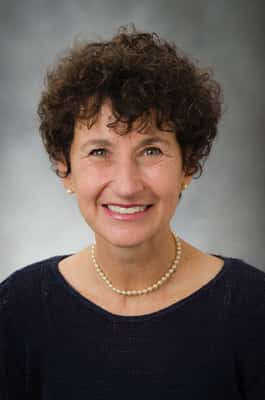 Unfortunately, in recent years, misinformation around vaccination has proliferated, and despite the efforts of reliable medical and scientific sources, some people still question the process. The result is the strength of community immunization is compromised and diseases such as measles are coming back. Cindy Greenberg, M.D., a pediatrician with MarinHealth Medical Network explains one view. “Some parents feel that it’s their right to be that one person in the herd.” Greenberg refers to parents who feel that since everyone else is vaccinated and protecting the entire population, they can forego the perceived risks from vaccination. The problem with that reasoning is that when many people feel that way, the strength of the “herd,” or the community immunity is compromised, and diseases can spread. “Some feel that other people should take the risk,” says Greenberg. “They’re hoping the rest of the people do so that they have the luxury of saying no. They may not feel it specifically that way, but that’s what’s happening.” Greenberg began her practice in 1996. “We didn’t have those shots when I was in training. I saw kids die of meningitis and bacterial infections.” Those diseases are rare, but according to Greenberg, the sentiment is the same for all vaccinations. “Part of the reason people feel they don’t need [vaccinations] anymore is they’re not seeing people die,” she says, adding that without a common occurrence of that horrible end, many parents feel the vaccine holds more risk than the disease it’s designed to prevent.
Unfortunately, in recent years, misinformation around vaccination has proliferated, and despite the efforts of reliable medical and scientific sources, some people still question the process. The result is the strength of community immunization is compromised and diseases such as measles are coming back. Cindy Greenberg, M.D., a pediatrician with MarinHealth Medical Network explains one view. “Some parents feel that it’s their right to be that one person in the herd.” Greenberg refers to parents who feel that since everyone else is vaccinated and protecting the entire population, they can forego the perceived risks from vaccination. The problem with that reasoning is that when many people feel that way, the strength of the “herd,” or the community immunity is compromised, and diseases can spread. “Some feel that other people should take the risk,” says Greenberg. “They’re hoping the rest of the people do so that they have the luxury of saying no. They may not feel it specifically that way, but that’s what’s happening.” Greenberg began her practice in 1996. “We didn’t have those shots when I was in training. I saw kids die of meningitis and bacterial infections.” Those diseases are rare, but according to Greenberg, the sentiment is the same for all vaccinations. “Part of the reason people feel they don’t need [vaccinations] anymore is they’re not seeing people die,” she says, adding that without a common occurrence of that horrible end, many parents feel the vaccine holds more risk than the disease it’s designed to prevent.
Balancing the risk equation
“The most common side effect is a sore arm or swelling where the shot was given,” says Karen Relucio, M.D., public health officer and deputy director, Health and Human Services Agency in Napa. “In some cases, the immune system is being primed, so you might have a temporary low-grade fever, chills, tiredness or body aches. The majority of side effects are self-limited.” In extremely rare cases (1-2 cases in one million), individuals may have allergic reactions or other serious side effects, but these risks are minimal compared to contracting and spreading a disease like measles, according to Relucio.
 “Measles is the most contagious disease out there—if one person has measles, up to nine out of 10 people can become infected if not protected by vaccination. Measles is not just a rash that comes and goes. It can be dangerous, especially for babies and young children. One in a thousand people with measles could die, or it can cause permanent neurological damage,” says Relucio. “If a child gets infected, they can develop pneumonia.” More common complications include ear infection and diarrhea. But according to Relucio, pneumonia is the most common cause of death from measles in young kids, and the dangers don’t stop there. “One child in every 1,000 will have swelling of the brain, which can lead to deafness and cause intellectual disability. One to three out of every 1,000 children who contract measles will die of respiratory complications. If a pregnant woman gets infected and she is unvaccinated, she can have a low-birthweight baby. A long-term, fatal complication of measles is a rare disease called sub-acute sclerosing pan encephalitis—a degenerative disease of the central nervous system, which can develop seven to 10 years after someone has had measles.” Not every child who develops measles will develop any or all of these severe complications, but there are risks associated with contracting and spreading the disease if your child is not vaccinated. “This does not only affect your own child,” Relucio says, emphatically. “You’re putting other children at risk by not getting your child vaccinated.”
“Measles is the most contagious disease out there—if one person has measles, up to nine out of 10 people can become infected if not protected by vaccination. Measles is not just a rash that comes and goes. It can be dangerous, especially for babies and young children. One in a thousand people with measles could die, or it can cause permanent neurological damage,” says Relucio. “If a child gets infected, they can develop pneumonia.” More common complications include ear infection and diarrhea. But according to Relucio, pneumonia is the most common cause of death from measles in young kids, and the dangers don’t stop there. “One child in every 1,000 will have swelling of the brain, which can lead to deafness and cause intellectual disability. One to three out of every 1,000 children who contract measles will die of respiratory complications. If a pregnant woman gets infected and she is unvaccinated, she can have a low-birthweight baby. A long-term, fatal complication of measles is a rare disease called sub-acute sclerosing pan encephalitis—a degenerative disease of the central nervous system, which can develop seven to 10 years after someone has had measles.” Not every child who develops measles will develop any or all of these severe complications, but there are risks associated with contracting and spreading the disease if your child is not vaccinated. “This does not only affect your own child,” Relucio says, emphatically. “You’re putting other children at risk by not getting your child vaccinated.”
So, how easy is it to contract measles? Relucio explains that the virus is airborne and can live for two hours in the airspace where an infected person was. To make matters worse, an unvaccinated person exposed to measles (or mumps or chicken pox) may be contagious a few days before symptoms show. If an unvaccinated child on family vacation contracts the disease, every traveller he encounters would be exposed to measles. The disease could further spread when passengers leave the plane and go on with their daily lives. According to the Center for Disease Control, measles is growing exponentially in the U.S. As of Nov. 2019, cases of measles countrywide rose from 63 in 2010 to 1,261 in 2019.
In 2014, a major outbreak at Disneyland infected 131 California residents. In 2019, six outbreaks were reported, with 72 confirmed cases.
Why would anyone want to risk such a disease by not vaccinating his or her children? “In many ways it’s puzzling because the science is so solid,” says pediatrician Ralph Myers, M.D., who practices in the Napa Valley. After 30 years working with families and children hospitalized with preventable diseases, his views on the efficacy of vaccination is unambiguous. “I often have parents say to me, ‘Well, we’ve always been healthy.’ Meaning, past experience is not going to change? They say, ‘We’re not going to expose our child to anybody.’ Which is absurd. You’re going to go to the grocery store, you’re going to expose somebody.” Myers suspects that people misunderstand, despite all the reliable information available, how diseases are transmitted and the risks of leaving their child unprotected.
“In some ways, vaccines have been a victim of their own success,” he says. “They work, and so we don’t see these diseases. We think, ‘What’s the risk?’” According to Myers, most parents have no problem accepting medicine to help a child who’s sick. But they resist vaccination to prevent their healthy child from getting a disease that may seem remote. The prevalence of misinformation and conspiracy theories all serve to create confusion. For example, people may resist vaccination because they read on the Internet that vaccines stress the immune system. The reality, says Myers, is the opposite. Vaccines strengthen the immune system. “It’s a learning process,” he says. “The immune system is like a muscle. The more you use it, the stronger it becomes.”
Another misunderstanding he hears from parents is because all these diseases have treatments, it’s okay to risk not vaccinating their child. If they get the disease, they’ll treat it afterward. “Well, that’s assuming a lot,” says Myers. “Sure, we have a treatment for bacterial meningitis, but we also see a lot of kids who get meningitis suffer hearing loss and other bad outcomes.”
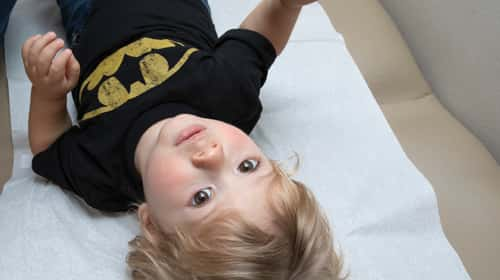 Recently, Myers’ practice took action to make the situation clear. “A number of years ago, we made a decision as a practice to no longer accept patients who would not follow the recommended vaccine guidelines and schedules,” says Myers. The decision came after many years and hours of talking with parents who were against vaccination. “I have to say, it was a great decision,” he says. Some families decided not to vaccinate and went elsewhere, but a much larger contingent chose to trust the medical philosophy of the practice and stay. The rest of his patients were overjoyed, according to Myers. “Some people drove down to the office when they got their letter, to thank us. When you’re bringing your child, especially your infant, into a waiting room, you want to know that everybody else in the waiting room is as vaccinated as they can be,” he says. With all that said, he remains sympathetic to parents and their struggles to make good decisions for their children.
Recently, Myers’ practice took action to make the situation clear. “A number of years ago, we made a decision as a practice to no longer accept patients who would not follow the recommended vaccine guidelines and schedules,” says Myers. The decision came after many years and hours of talking with parents who were against vaccination. “I have to say, it was a great decision,” he says. Some families decided not to vaccinate and went elsewhere, but a much larger contingent chose to trust the medical philosophy of the practice and stay. The rest of his patients were overjoyed, according to Myers. “Some people drove down to the office when they got their letter, to thank us. When you’re bringing your child, especially your infant, into a waiting room, you want to know that everybody else in the waiting room is as vaccinated as they can be,” he says. With all that said, he remains sympathetic to parents and their struggles to make good decisions for their children.
Risk vs. benefit
“We have risk versus benefit decisions to make all the time,” says Myers. “And any time you elect to put something in your child’s body, it’s never risk-free. That includes food and medications. However, the risks of vaccines are so much less than the risks of getting one of these diseases and having a bad outcome. It just makes perfect sense.”
Greenberg agrees. “Vaccines are lifesaving. We are protecting children every day by giving them immunizations. And it’s not a government take-over, or conspiracy. These are real diseases that many of us have seen children die from. And we’re just so fortunate that people have spent the time and the money to find ways to prevent these diseases.”
Information needs to come from reliable sources. “That just doesn’t go for vaccines,” says Harris. “It goes for anything. Look at the sources you’re getting. And if you see 99 percent of the sources have legitimate credentials in terms of being specialists in infectious diseases, people who devote their lives to [medicine], and you have a small fringe minority saying otherwise—who do you choose to believe at this point?”
From the public health point of view, Relucio is clear. “Vaccines are safe and are the most effective method to protect people from the effects of communicable diseases,” she says. Relucio advises parents who want credible information to read the latest information collected by the California Department of Public Health or the Centers for Disease Control and Prevention. But above all else, she stresses the urgency to get all children vaccinated.


